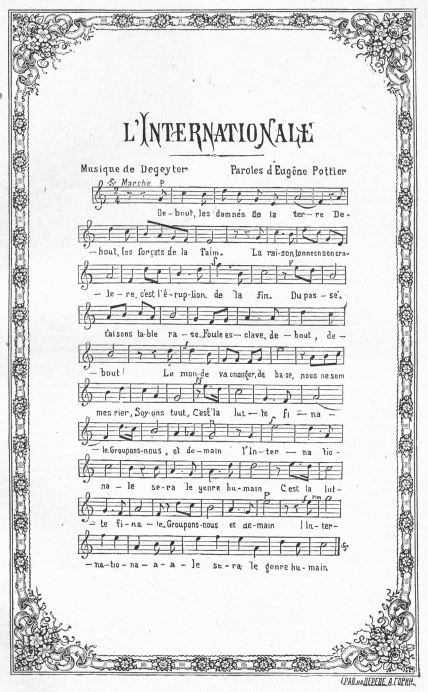
The Internationale
"The Internationale" (/ˌɪntərnæʃəˈnɑːl, -ˈnæl/ IN-tər-nash-ə-NA(H)L; French: "L'Internationale" [lɛ̃tɛʁnɑsjɔnal]) is an international anthem that has been adopted as the anthem of various anarchist, communist, socialist, democratic socialist, and social democratic movements.[1][2] It has been a standard of the socialist movement since the late nineteenth century, when the Second International adopted it as its official anthem. The title arises from the "First International", an alliance of workers which held a congress in 1864. The author of the anthem's lyrics, Eugène Pottier, an anarchist, attended this congress.[3][4] Pottier's text was later set to an original melody composed by Pierre De Geyter, a Marxist.[5]
"Internationale" redirects here. For the Billy Bragg album, see The Internationale (album). For other uses, see Internationale (disambiguation).Also known as
It is one of the most widely translated anthems in history.[6]
English: The Internationale
Аркадий Коц (Arkady Kots), 1902
Pierre De Geyter, 1888
1902
1918 (Russian SFSR)
1922 (Soviet Union)
1922 (Russian SFSR)
1944 (Soviet Union)
Allusions in other works[edit]
The "anthem" in the early pages of George Orwell's Animal Farm has been described as a "parody"[84] or a "reconfiguration"[85] of "The Internationale"; Orwell's text states (as a "humorous introduction") that it was sung as "between Clementine and La Cucaracha",[86] in reference to "Oh My Darling, Clementine" and "La Cucaracha".[85]
William Carlos Williams' poem Choral: The Pink Church alludes to the lyrics of "The Internationale" in order to symbolise Communism, the poem otherwise barely mentioning Communism directly, Williams himself claiming to be "a pink [...] not a red" in a letter discussing the poem.[87]
One of Aleksandr Lebedev-Frontov's most famous works, which hung in the headquarters of the National Bolshevik Party, is a poster of the French Fantomas aiming a pistol at the viewer, subtitled with the first line of the Russian version of "The Internationale".[88]
The Russian poet Vladimir Mayakovsky concluded his play Mystery-Bouffe with an "Internationale of the Future", set to the tune of the Internationale, but with lyrics describing a complete, perfect classless society as an existing fact.
Documentary film on the anthem[edit]
Peter Miller produced and directed a half-hour documentary on the anthem (The Internationale (2000) First Run/Icarus Films) with interviews with a range of people including Annette Rubinstein, Vladimir Grigorʹevich Zak, Marina Feleo-Gonzalez, Pete Seeger, Dorothy Ray Healey, Li Lu and Billy Bragg. The film aims to provide a cultural history of the anthem that addresses the complexities of the relationships between the collective and the individual. [89][90] The film was short-listed for the Academy Award nomination for the Best Short Documentary and won the Woodstock Film Festival, Best Short Documentary award.[91]